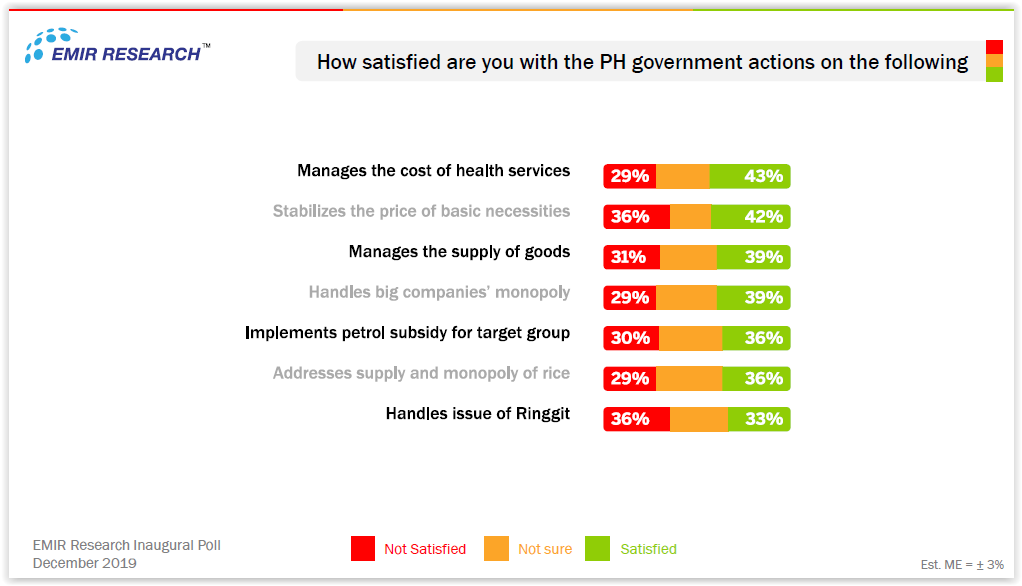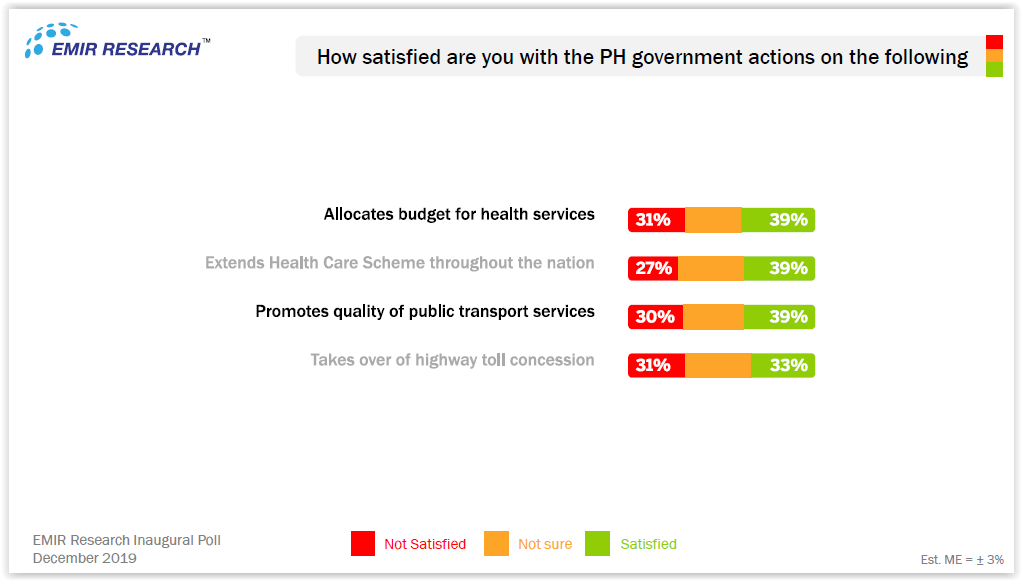KUALA LUMPUR, Dec 13 — The way the government handles the cost of health services earned the greatest satisfaction from Malaysians in an Emir Research survey despite high medical inflation.
The study by the independent think tank on public satisfaction towards the fulfillment of Pakatan Harapan’s (PH) 2018 election manifesto showed 43 per cent of respondents expressed satisfaction with health care costs in Malaysia, followed by satisfaction with these government actions: stabilising the price of basic necessities (42 per cent), managing the supply of goods (39 per cent), and handling big companies’ monopoly (39 per cent).
More than a third expressed satisfaction with a petrol subsidy for the target group (36 per cent), followed by satisfaction with the government addressing the supply and monopoly of rice (36 per cent), and handling the issue of the ringgit’s value (33 per cent).
Only 29 per cent of respondents said they were not satisfied with how the government managed the cost of health services, while the rest were unsure. It’s unclear if respondents were referring to health services in Ministry of Health (MOH) or private facilities, or public university hospitals.
“On health service costs, the 43 per cent satisfaction level could be due to the government’s effort to ensure continuous affordable access to health care for the rakyat,” Emir Research said in a statement.
“Nonetheless, partial privatisation in selected hospitals or provision of private wings in government hospitals would have an impact on the expenses of the patients. This is because prices are ‘pegged’ to the private sector, so any inflationary increase in the private sector would also be commensurately reflected in the private wings of government hospitals.”
The think tank also cited a 2017 survey of 11 Asian countries on health care matters that found Malaysia had the third-highest health care inflation rate at 12.7 per cent, which it said was “way higher” than Malaysia’s headline inflation rate of core items.

The public’s satisfaction with health care costs in Malaysia, according to Emir Research’s survey, comes even as MOH is seeking to regulate medicine prices, despite opposition from health care providers and pharmaceutical companies.
Emir Research’s survey showed that urbanites were happier with the way PH managed health care costs at 45 per cent, compared to 34 per cent of rural respondents.
Older people were more satisfied than younger ones about the cost of health services in Malaysia, with more than half (53 per cent) of respondents aged 51 and above expressing satisfaction, followed by the 41-50 age group (47 per cent), those aged 31 and below (42 per cent), and the 31-40 age group (38 per cent).
Middle-income earners making RM3,001 to RM5,000 monthly were the most satisfied with the way the government managed health care costs at 46 per cent, followed by those earning RM3,000 and below monthly at 44 per cent. Less than a third of respondents making RM5,000 and above monthly, or 31 per cent, were satisfied with the cost of health services.
Health Services Budget, Health Care Scheme

The highest satisfaction level of 39 per cent in the health and transport dimension of the study went to efforts in allocating the budget for health services, extending a health care scheme throughout the nation, and promoting the quality of public transport services. Emir Research, however, did not define “health care scheme” in the survey, so it’s unclear if the term refers to the government health screening programme Peka B40, or something else.
“Generally, urban respondents were more satisfied compared to their rural counterparts in relation to the extension of health care provisions throughout the nation,” said Emir Research.
Four out of 10 urban respondents expressed satisfaction with the extension of a health care scheme throughout Malaysia, higher than 30 per cent of rural residents.
Older respondents were more worried about health care issues, with only 30 per cent of those aged 51 and above expressing satisfaction with the health budget, followed by the 41-50 age group (34 per cent), the 31-40 age group (42 per cent), and almost half or 47 per cent of those aged 31 and below.
Similarly, with the extension of a health care scheme throughout Malaysia, younger respondents were more satisfied at 46 per cent of those aged 31 and below, followed by the 31-40 age group (43 per cent), the 41-50 age group (32 per cent), and those aged 51 and above (30 per cent).
Wealthier respondents were happier with Malaysia’s health budget at 51 per cent, followed by the middle-income earning RM3,001 to RM5,000 monthly at 49 per cent, and those making RM3,000 monthly and below at 38 per cent.
Richer respondents were similarly more satisfied with the government’s health care scheme, at half of those earning RM5,000 and above monthly, followed by 47 per cent of those making RM3,001 to RM5,000 monthly and 37 per cent of those earning RM3,000 and below a month.
Less educated people (those with Form Six, Form Three or Primary Six qualifications) were happier with the government’s budget for health services and a nationwide health care scheme at 52 per cent and 54 per cent respectively, compared to more educated people.
A total of 42 per cent and 43 per cent of diploma holders expressed satisfaction with the government’s health budget and Malaysia’s health care scheme respectively, followed by 35 per cent and 33 per cent for degree holders’ satisfaction in those two issues respectively.
Emir Research’s survey was conducted nationwide last September among 1,992 respondents, with quota sampling used in 19 randomly selected clusters among Malaysia’s 222 parliamentary constituencies. Quota sampling ensured that respondents sampled had demographic characteristics, like race, gender, and age, reflected the actual population within the constituency.








